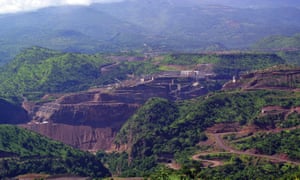According to reports, released this week, by two teams of British, American and EU diplomats who visited the resettlement areas in the Lower Omo Valley in southern
Ethiopia last year, the lives of 20,000 Mursi, Bodi and other semi-nomadic tribespeople are being “fundamentally and irreversibly” changed by the mega-project.
The $5bn (£3.3bn)
Gibe III dam, which towers 243 metres high and will generate 1,870 megawatts (MW) of electricity when completed later this year, will irrigate up to 175,000 hectares of land previously used by herders and small farmers. Constructed with money from the World Bank it has already been linked by human rights groups and anthropologists to
conflict and widespread abuses by the Ethiopian government.
But the UK government, which is Ethiopia’s largest donor, twice rejected freedom of information requests to release the findings of the diplomats’ field visits to the resettlement areas on the grounds that publication could jeopardise relations between the countries.
“Releasing the information requested could significantly damage the UK’s ability to deliver government policy and to protect and promote UK interests,” it argued.
However,
two documents from the Donor Advisory Group released to Survival International by the European commission this week suggest that the Ethiopian government insisted that indigenous communities living downstream of the dam had no choice but to quit their ancestral lands to make way for the plantations.
In over 30 pages of reports of meetings held with communities and individuals last year, the diplomats say that the Ethiopian government did not obtain the
full prior consent of the tribes as recommended under international law. Many of the tribes had no idea that the dam would effect them, they said.
People from one un-named village were said to have been: “placed in a muddy and isolated site, in inferior huts. Their situation was deplorable; the absence of sanitation means [they] are suffering diseases such as bloody diarrhea and malaria. Services are unavailable, it takes a two-hour walk to the nearest canal for bad quality drinking water while the nearest health post is eight hours on foot. Residents say the government does not allow this group to move out.”
The diplomats reported that the remote Omo Valley has been totally transformed since the river Omo was blocked and irrigation canals built. They said they expected the influx of 500,000 workers, mainly from the Ethiopian Highlands, would lead to ethnic conflict and widespread social destabilisation.
A second group of British, EU and other diplomats who visited groups of resettled Suri people heard evidence of corruption, financial mismanagement, land grabbing, inter-tribal raiding, and poorly planned settlements.
The diplomats, who were accompanied at all times by government officials, said they found no evidence of forced migration but stated that the government was not offering the semi-nomadic communities any alternative to permanent settlement and had not fully consulted groups before evicting them.
They also found that the giant sugar plantations would deny the tribespeople access to grazing and farming lands on which they depend for survival. Around 200,000 people in the Omo Valley are likely to be affected by the dam in some way.
“It seems clear that local government and plantation have decided that resettlement is necessary. Government is not offering communities any alternative but to settle permanently,” said one report.
While some communities and individuals said they welcomed a more sedentary life with better access to health and education in the new villages, many others fiercely rejected the government scheme and have sought to remain independent.
The diplomats said they were not confident that they were getting a clear picture from communities whose testimonies were translated by government officials who appeared “anxious and distracted”. It was only when interviews were conducted without interpreters that they felt confident they were receiving an accurate impression of the situation.
“Security is a major concern linked to an increase in the proportion of armed men and the use of alcohol. Traditional systems of conflict resolution are declining ... these cultural trends tend to increase the number of killings,” one report said.
Britain’s Department for International Development (Dfid) has denied any responsibility for resettling people in the Lower Omo Valley but said it had contributed money for education, health, road projects and basic services across Ethiopia, potentially including the valley.
The reports are embarrassing for the UK government because Britain was the largest of 21 international donors to a $4.9bn World Bank-organised funding program called Promoting Basic Services (PBS). This was designed to pay for health, road and water provision for people in resettlement areas across Ethiopia. Earlier this year it pulled out of the scheme having contributed an estimated £750m.
In a statement, Dfid said: “The UK has never funded Ethiopia’s resettlement programmes. Ethiopia remains one of the poorest countries in the world. UK aid to Ethiopia is improving the lives of millions of people by supporting health, water and education programmes, promoting job creation and improving people’s nutrition.
“Our previous support to the Promoting Basic Services programme paid for health, education, water, roads and agricultural services provided by local governments. It did not support Ethiopia’s resettlement programmes.”
The two teams of diplomats made 37 recommendations to the Ethiopian government. These ranged from ensuring that all resettlement programnmes are voluntary, to guaranteeing water and latrines in villages, consulting people before moving them, and offering people alternatives to becoming sedentary.
Survival International accused Britain of trying to cover up abuses by the Ethiopian government. “It took Dfid almost two years to investigate allegations of serious
human rights violations. The two reports which it tried to prevent the public from reading show just how far it will go to cover up abuses by a regime which receives hundreds of millions of pounds of UK tax payers’ money,” said spokeswoman Elizabeth Hunter.
The Ethiopian government said in a statement: “Last year’s Donor Advisory Group (DAG) report was generally positive, but where recommendations were made, or when the government itself noted that there was obviously a need for improvement, it has taken remedial action and improvements have been made, and continue to be made on an on-going basis.”
This, says International Rivers, could make the difference between marginal livelihoods and famine for the tens of thousands of already vulnerable people who depend on the lake for their livelihoods.

